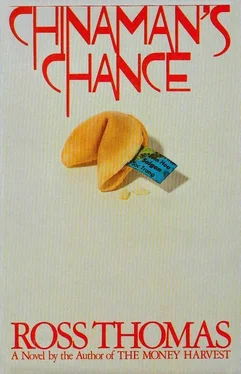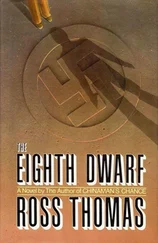Ross Thomas
Chinaman’s Chance
The pretender to the Emperor’s throne was a fat thirty-seven-year-old Chinaman called Artie Wu who always jogged along Malibu Beach right after dawn even in summer, when dawn came round as early as 4:42. It was while jogging along the beach just east of the Paradise Cove pier that he tripped over a dead pelican, fell, and met the man with six greyhounds. It was the sixteenth of June, a Thursday.
Artie Wu and the man had often seen each other before. In fact, nearly every morning for the past two months, except on weekends, they had passed each other, Artie Wu in his blue sweat suit, the man in shirt and slacks, both of them barefoot. At first they had merely nodded, but later they spoke, although it never went much further than “Morning” or “Nice day.”
The greyhounds, all brindle colored, traveled in a tight, disciplined pack at the man’s heels. But sometimes, at the man’s silent hand signal, a kind of choppy, almost brutal gesture, they would leap forward and race one another to the pier, streaking along at sixty miles per hour, or however fast greyhounds run. After they reached the pier they would stop, turn, and trot back to the man, their mouths open, their long pink tongues licking their muzzles, as they seemed to laugh and josh each other about what fun the race had been.
After Artie Wu tripped over the dead pelican, he felt himself falling and said, “Shit” just before he hit the sand. The man with the six greyhounds wasn’t far off, not more than forty feet away, and when he saw Artie Wu fall he thought, There goes the fat Chinaman.
The man had always assumed that Artie Wu was a neighbor, or at least lived somewhere nearby, perhaps in one of the trailers in Paradise Cove. For a while he had tried thinking of Artie Wu as the fat Chinese, but for some reason that hadn’t rung true, so after about a month the man had gone back to “fat Chinaman,” although the description still made him just a bit uncomfortable.
When Artie Wu bothered to think about who he was, which was seldom, he usually thought of himself as a fat Chinaman. He had thought of himself as such ever since he was six years old and they had dumped him into that San Francisco orphanage where he had stayed until he ran away at fourteen. Sometimes, of course, when it suited his purpose, he also thought of himself as the pretender to the throne of the Emperor of China.
The man with six greyhounds hurried over to where Artie Wu lay half sprawled on the sand and asked, “Hurt yourself?” One of the dogs, as though to express his own concern, gave Wu’s face a wet lick.
“I don’t know yet,” Wu said as he sat up, bent forward, grasped his bare left ankle with both hands, and squeezed hard. The pain was there, all right, not blinding, but sharp, almost searing, and Artie Wu said, “Shit” again — but in a rather noncommittal way, so that the only other evidence of pain that he offered was the film of sweat that popped out on his forehead. One of the greyhounds gave the sweat a quick lick and then smacked his lips as though he liked the taste.
“Get away, Franchot,” the man said, and the greyhound promptly moved back, sat down on his haunches, and gazed out at the ocean as though he had discovered something wonderful and strange out there.
“Franchot?” Wu said.
“After Franchot Tone.”
“Cute,” Wu said, and then got into a kneeling position to find out whether he could rise using only his right leg. He was two and three-quarters inches over six feet tall and weighed 248 pounds, but only twenty of that was really lard, most of which had settled in around his gut, although enough had spread to his face to make him look fat and jolly and almost benevolent. Laughing Buddha was what a number of persons, mostly women, had told him that he looked like, and he had long ago grown sick of hearing it.
That which wasn’t fat was mostly big bone and hard muscle, and on any normal day Artie Wu could easily have raised himself to a standing position using only one leg. The pain, however, had done something to his balance, and he found that he had to put his left foot down for support. When he did, the pain shot through his lower left leg and ankle, even worse than before. So he said, “Shit” for the third time that morning and sank back down into a sitting position on the sand.
“Let me give you a hand,” the man said.
Artie Wu nodded and said, “Okay. Thanks.” The man helped him up and in doing so learned from Wu’s grip that there was far less flab to the fat Chinaman than he had thought.
“You live around here?” the man said.
“My partner does,” Artie Wu said. “The yellow house there.”
The sand that they were standing on was at the edge of the water and had been packed down hard by the surf. A few yards beyond this the beach rose sharply, not quite straight up, for three or four feet and then leveled off for sixty or seventy feet until it ran into a high bluff of tan earth that was partly covered with green succulents and gray weeds. The yellow house had been built at the base of the bluff and rested on creosoted piling that raised it about a dozen feet above the sand, which was probably high enough to keep it dry from anything except a tidal wave.
A flight of wooden steps ran up from the sand to the broad redwood deck that edged out from the house on three sides. Most of the front of the house was glass. The trim was a very pale yellow, and the roof was of dark green composition shingles. The house didn’t look very large to the man with six greyhounds. Two bedrooms, one bath, he thought. No more.
“Ever any good at hopscotch?” he asked Artie Wu.
“Not bad.”
“Ready?”
Artie Wu nodded. He had his right arm around the man’s neck and shoulders now, and with the man’s support he started hopping on his right foot toward the house. Going up the steep three- or four-foot sand incline was hard, but they managed it, and then when the beach leveled off it got easier until they reached the stairs. The greyhounds had followed along in their tight cluster, alert and interested and looking quite ready to offer advice if but asked.
The two men eyed the stairs for a moment and then, without speaking, shifted positions so that Artie Wu’s left arm, rather than his right, went around the man’s neck and shoulders. They started up the stairs then, Wu using his right hand on the banister to give a lift to his hops.
Once up on the deck they moved past the round redwood table with the Cinzano umbrella sticking up out of its center and over to a half-glass door that led into the kitchen-dining area.
“It’s not locked,” Artie Wu said. The man nodded, opened the door, and helped Wu hop inside.
The dining area blended into a living room whose far wall was covered, floor to ceiling, with books. Next to the wall of books was the wall of glass that looked out toward the sea. A man who wore nothing but a pair of faded blue jeans, their legs apparently sawed off at the thighs, stood in the corner that was formed by the walls of books and glass. He stood next to a newsprinter that was clacking away with the sharp, gossipy sound that all newsprinters have. The man was tall, taller even than Artie Wu, but lean — almost, indeed, skinny.
The man turned quickly from the newsprinter to stare at Artie Wu. He wore the deep tan of an old lifeguard, which made his white grin seem whiter than it was. “What the hell happened to you?” he said.
“I tripped over a dead pelican,” Artie Wu said.
“Let’s get him over here,” the man with the deep tan said, and moved quickly away from the newsprinter to help the other man ease Artie Wu down into a black leather Eames chair that was so worn and used that it almost looked old-fashioned.
Читать дальше












